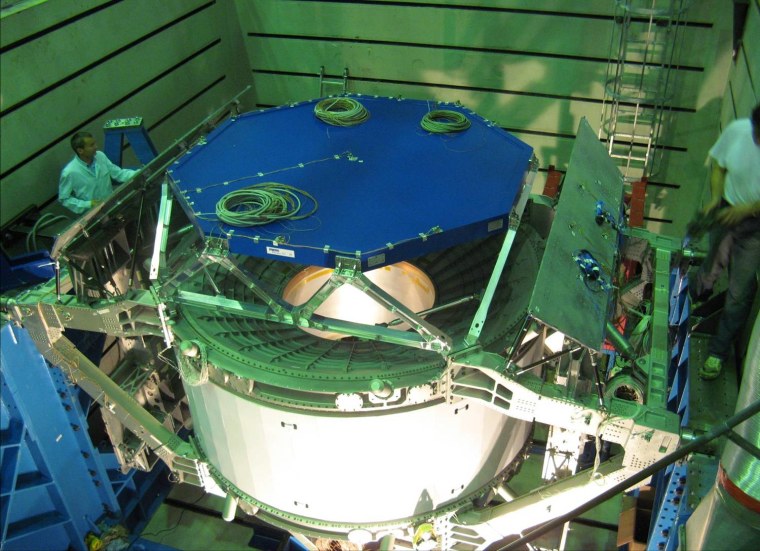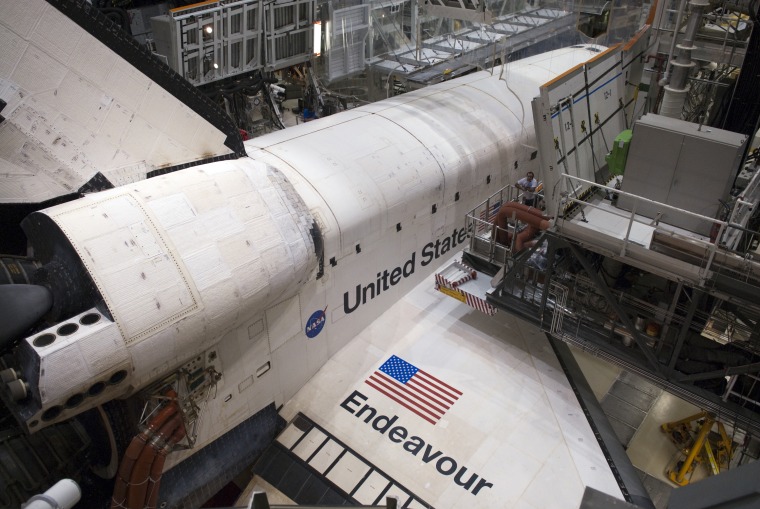The space shuttle's last big-time science experiment, the Alpha Magnetic Spectrometer, has delayed the end of the shuttle era from mid-September to at least mid-November.
The $1.5 billion particle detector is to be mounted on the station for an extended series of physics experiments, including a search for the universe's mysterious dark matter. The spectrometer may also help scientists gain new insights into the nature of antimatter and the origins of cosmic rays.
The spectrometer had been scheduled to fly aboard the shuttle Endeavour to the International Space Station in July. But NASA says the 7-ton instrument's helium-cooled, superconducting magnet must be replaced with a different type of magnet to extend its lifetime from a few years to a decade. To do this, scientists need more time, and NASA has decided to rearrange the launch dates of its final three space shuttles.
The upcoming flight of the shuttle Atlantis remains on schedule for launch no earlier than May 14. But the July flight of the shuttle Endeavour carrying the spectrometer will now leapfrog the shuttle Discovery's launch, currently set for Sept. 16.
Endeavour's mission will now be launched no earlier than mid-November, NASA says.
Scientists decided to replace the magnet in part because the Obama administration called for the extension of space station operations from 2015 to 2020. Without the switchover, the spectrometer would essentially have been a useless appendage on the station for more than five years.
"We began thinking about this at the end of last year and the beginning of January when people were talking about the space station going to 2020 and beyond," Samuel Ting, a Nobel-winning physicist at the Massachusetts Institute of Technology who oversees the AMS project, told Reuters in an interview. "I began to realize that we'd have a museum piece."

Dumping AMS' cryogenically cooled magnet cuts the device's power to bend the path of charged cosmic particles as they pass through five different types of detectors. But Ting said that adding more precision detectors and the extra years in orbit will more than compensate for that.
The replacement magnet, which flew in a prototype AMS during a 1998 shuttle mission, was taken out of clean-room storage in Germany and tested. No degradation was found. The magnet is scheduled to make its arrival this week at Europe's CERN nuclear research center in Geneva where the AMS is being assembled.
Delaying the last shuttle flight will give the 6,000 to 8,000 workers at Kennedy Space Center preparing for layoffs a short reprieve.
Obama's budget request for NASA for the year beginning Oct. 1, which still must be approved by Congress, includes $600 million to keep the program going until the end of the year if necessary to accommodate technical or weather-related delays.
This report includes information from NBC News' Jay Barbree in Cape Canaveral, msnbc.com's Alan Boyle and Reuters' Irene Klotz.
